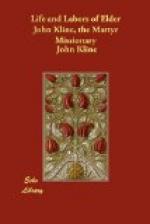Sermon by Elder John Kline.
Preached at Tobbins, Sunday, January 10.
TEXT.—As ye therefore
have received Christ Jesus the Lord, so walk
ye in him.—Col.
2:6.
Paul addressed these words to the church at Colosse, a city of Asia Minor, in the Roman province called Phrygia. It may be of interest to you for me to tell you something about the character of these people at the time Paul first visited them. Ancient history gives a very dark picture of this. What Paul said of Athens applied equally to Colosse: “The city was wholly given to idolatry.” The lower classes, especially, were very ignorant, having no knowledge of God save that which the light of nature gave them.
But when Paul went into their midst, preaching the Gospel of salvation, the prophecy of Isaiah, concerning Zebulon and Naphtali, was fulfilled unto them, as it had been before at Capernaum on the shore of the Galilean Sea: “The people which sat in darkness saw a great light; and to them which sat in the region and shadow of death, to them did light spring up.” They opened their eyes to the light and rejoiced to see it; and their hearts to the love it revealed, and they took it in. They accepted Christ Jesus the Lord in all his fullness. Faith became to them a living principle. They felt its truth as surely as though with their natural eyes and ears they saw and heard all that it comprehended for time and eternity, for earth and heaven.
But you want to know how I find all this out. Turn with me to the first chapter of Paul’s letter to them, and I will show you. Now notice that right in the beginning he addresses them as “SAINTS and FAITHFUL BRETHREN in Christ.” By “saints” he means that they are holy; and by “faithful brethren” he means to tell how they got to be so. This, I think, is saying a good deal for them; but he goes on: “We give thanks to God, the Father of our Lord Jesus Christ, praying always for you; having heard of your FAITH in Christ Jesus; and of the LOVE which ye have toward ALL the saints, because of the HOPE which is laid up for you in the heavens.”
You now see that these Colossian brethren had the three essentials that distinguish a Christian from a pagan, a saint from a sinner, and an angel of light from a demon of darkness. These three are faith, hope and love; but of these Paul says that “love is the greatest.” This they had in large measure, because it extended “toward ALL the saints.” It is natural for every Christian to love SOME of the saints when he is free “to pick and choose;” but to love ALL is quite another thing.
If you will thoughtfully read this first chapter through, you will see the high place these Colossian brethren held in Paul’s confidence, not only as to faith and love, but also as to the enlightenment of their understandings with heavenly wisdom. He sets forth our Lord Jesus Christ as the triune God—Creator, Redeemer and Savior—in loftier terms than are to be found anywhere else in his epistles. Had there been any doubt in his mind as to their ability to understand these revelations, and thus profit by them, they would have been withheld. He would have fed them with milk, as he did his Corinthian and Hebrew brethren, and not with strong food.




